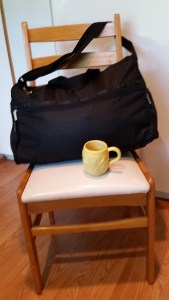On the last day of school, when the last child runs out of her classroom, a teacher puts her school bag on her naked desk top and surveys her quiet classroom and its overflowing trash bags and naked bulletin boards. Hearing a buzzing by the open window, she smiles as she remembers the screams of Bee! Bee! when her students were in residence. It’s quiet now as she waits for her principal to come in and sign off on her “Closing Classroom To-Do List,”
As the teacher turns her head, she can hear the cricks in her neck. She knows those cricks are from carrying her heavy school bag on her left shoulder every day from home to school. She’s been carrying this particular bag for twenty years—she’s tripped over it, lost it, found it, and caressed it on her lap on crowded subways.
Like a good teacher, a teacher’s school bag must be flexible. It must be able to mold and stretch to accommodate many sizes and shapes. Teachers don’t just carry student papers, grade books and red pens. They haul lesson materials from their kitchens, bathrooms, supermarkets and backyards. I’m also sure that teachers have filled their school bags with warm clothing (jackets, sweaters, mittens, and hats) for their cold kids.
At one time or another, depending on where I was in my career, my bag has held:
- Worms
- Boiled chicken bones
- Pounds of poetry books. (Never did get back the one written by Tupac Shakur. Had to pay my local library for that one.)
- Heavy sets of glorious picture books about Genghis Khan, The Civil War, and Endangered Animals
- Colanders, strainers, metal pie plates, mixing bowls, and cupcake pans.
- Crime scene materials
- Rocks
- Hundreds of empty black film canisters…can’t even find one now.
On this last day of school, our teacher’s bag is packed with stuff that she will explore for next year’s class. She wasn’t very orderly about packing it up; just threw stuff in so it would be there when she was ready for it.
She’s drained from the heat and the task of keeping her kids reasonably safe and sane during the chaos of the June clean-up, but she knows her colleagues want to go out and celebrate. So, because she’s a good sport, she’ll join them.
When she gets home she’ll put her teacher bag in her closet, she will unwind, and she will move on with her life.
If you are a teacher, what will you do with your school bag? Will you throw it in a closet and forget about it until August or maybe even the night before school starts? Will you empty it right away and fill it with vacation regalia?
If you’re retiring, will you caress your empty bag, now an artifact of the good work you did?

